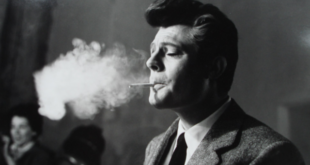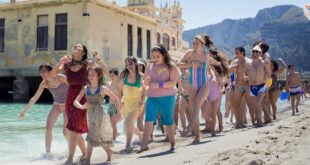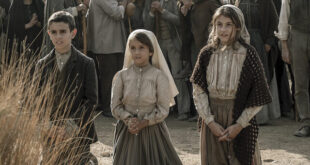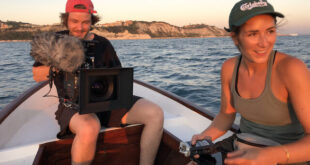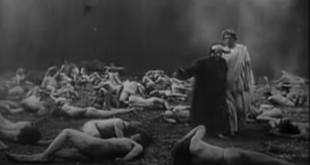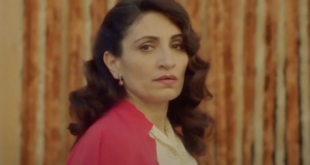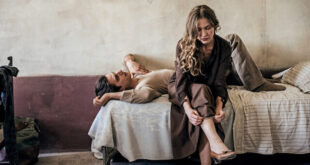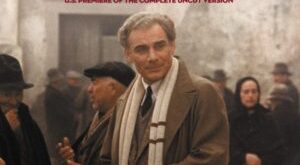Born in 1930, Arturo Zavattini is known for his work as a photographer, cinematographer and director of photography. His father, Cesare Zavattini, was a longtime collaborator of Federico Fellini and Vittorio De Sica, and Arturo practically grew up on film sets. He worked as an assistant and camera operator on famous Italian films such as “Il bidone,” “La dolce vita” and “Divorce Italian Style.” He also worked as an ethnographic photographer, accompanying anthropologist Ernesto de Martino on his famous expedition to Lucania in 1952. Being a teenager in Rome during the post-war years, Zavattini was influenced by the neorealist movement …
Read More »Tragedy echoes through time in “The Macaluso Sisters”
In a moving story that spans several decades, “The Macaluso Sisters” follows five orphaned sisters born and raised in an apartment located on the outskirts of Palermo. They support themselves by renting out pigeons for events. Directed by Emma Dante, who adapted the film from her own 2014 play by the same name, the all-female cast interprets the story in three chapters that show how the tragic events of a single day can follow a family through childhood, adulthood and into old age. The first chapter reveals the tragedy of the youngest sister, Antonella, dying during a beach outing. She …
Read More »New film views Fatima from differing perspectives
Based on the true story of the 1917 Marian apparitions reported by three children at the Cova da Iria in Portugal, Marco Pontecorvo’s 2020 drama. “Fátima” offers a contemporary take using new technology. “The cinemascope format can give back to the audience a much stronger emotion and can help people enjoy the stunning cinematography by Vincenzo Carpineta,” Pontecorvo says. The director got involved with the project after producers saw his 2009 feature film, “Pa-ra-da,” that addresses the issue of homeless children in post-Ceausescu Romania. Impressed by his direction of the children, they suggested he direct “Fatima.” He felt the story …
Read More »First-time filmmakers net rare Tribeca film fest nod
It’s unusual for first-time filmmakers to be recognized by a high-profile international film festival but such is the case with Cecilia Pignocchi and Arthur Couvat. Their debut work, “Grottaroli,” is in the official lineup of the 2021 Tribeca Film Festival’s Shorts Program. Set along the Adriatic Coast, the 14-minute film follows a group of veteran fishermen as they reflect on their vanishing way of life. Describing the fifth character as the sea, Pignocchi and her co-director offer total immersion into a culture that few outside the area knew existed. I spoke with Pignocchi about the making of the short …
Read More »The world of cinema loses a master with Rotunno’s passing
Italy recently said goodbye to one of its most beloved filmmakers. Cinematographer Giuseppe Rotunno passed away on Feb 7, 2021, at the age of 97. Rotunno was one of the most prominent cinematographers of all time. Throughout the decades, he collaborated on cinematic masterpieces with the likes of Federico Fellini, Mario Monicelli, Luchino Visconti and Terry Gilliam. The first film he worked was in 1943 as a camera assistant on “L’uomo dalla Croce” (The Man With a Cross) by Roberto Rossellini. In 1956, he made his debut as a cinematographer alongside director Carmine Gallone on “Tosca” followed by “Le notti …
Read More »Early cinematic master takes viewers to hell and back
Born in Naples on January 10, 1869, Giuseppe de Liguoro is credited with creating epic films that reached beyond the borders of his country. Among the iconic silent films he directed during the second decade of the 1900s are “L’Inferno” and “L’Odissea.” Both were released in 1911. “L’inferno” was roughly adapted from the first part of Dante Alighieri’s “Divine Comedy” and was Italy’s first completed feature film. The project took more than three years to make and was directed by Liguoro, Adolfo Padovan and Francesco Bertolini. The gruesome story is set in the depths of Hell as Dante is guided …
Read More »Lavini reflects on role in live streaming biopic
The organizers of film festivals all over the globe have given new meaning to the phrase “the show must go on” by making their line-ups available in virtual theaters. By doing so, festival goers can stream films in the comfort and safety of their own homes. A number of Italian films have been included in these virtual platforms, including Pietro Marcello’s acclaimed “Martin Eden” and Gianfranco Rosi’s new documentary, “Notturno,” which is Italy’s Oscar submission. The latest virtual offering of contemporary Italian cinema is a joint effort by the Seattle International Film Festival and Luce Cinecittà, which will make the …
Read More »Local filmmaker Giancarlo Iannotta
Chicago-born filmmaker Giancarlo Iannotta’s “My Country” is a labor of love and symbol of pride for his Italian origins. A story of two brothers who meet as adults, the film is a lighthearted adventure with dramatic undertones, which deal with issues of abandonment and the lifetime repercussions it could bring when left unaddressed. As Lucky (Giancarlo Iannotta) cares for his dying father, a family secret is revealed. Once his father passes away, he boards a plane to Rome in search of the truth and finds his long lost brother, Francesco (Antonio Palumbo). Francesco’s initial reaction is to run the other …
Read More »Contemporary Italian cinema goes virtual
A number of contemporary Italian films will be available to stream in the coming months. Gianfranco Rosi’s new documentary “Notturno” will be available via the New York Film Festival’s Virtual Cinema on October 6. Having just premiered at the Venice Film Festival, the documentary film was shot over a three-year period along the borders between Syria, Iraq, Kurdistan and Lebanon. Rosi gives voice to a human drama that transcends geographical divisions and time, with encounters and images of the life that is impacted by the continuous tragedy of civil wars, brutal dictatorships, foreign invasions and interference and living in the …
Read More »“Christ Stopped at Eboli” director’s cut now playing in New York
The story and landscape of Lucania are in the spotlight during the month of April. A rare, uncut version of Francesco Rosi’s 1979 film “Christ Stopped at Eboli” is being shown at the Film Forum in New York City’s West Village. The screenplay was adapted from the book by Carlo Levi, a doctor, writer and painter from Torino who was exiled to the southern region of Lucania (today, Basilicata) because of his political beliefs. The year was 1935 and Benito Mussolini’s Fascist Party was in power. Levi was forced into exile due to the silencing of those who spoke out against fascism. …
Read More » Fra Noi Embrace Your Inner Italian
Fra Noi Embrace Your Inner Italian

